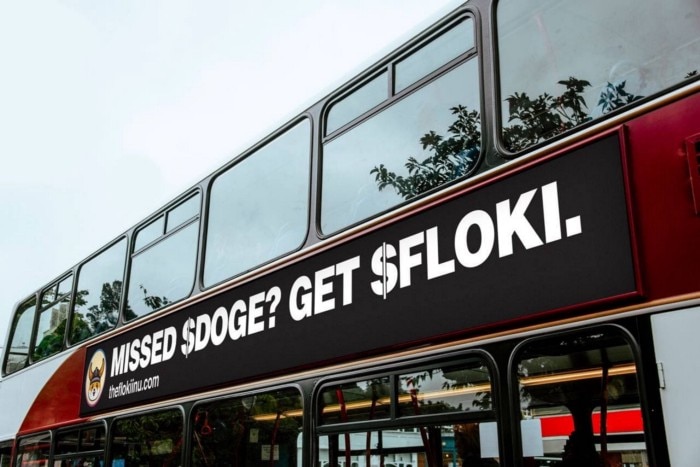UK advertising watchdog probes crypto meme coin Floki’s marketing ‘assault’ on London transport

The Advertising Standards Authority (ASA) has bowed to calls for an investigation into an ad campaign for a digital token named after Elon Musk’s new dog, Floki, after hundreds of adverts for the cryptocurrency appeared across the capital’s transport network.
A spokesperson for the ASA told City AM that the watchdog is currently investigating the campaign, to “determine whether any rules were broken” in relation to the UK’s advertising regulation.
The (ASA) has previously pledged a crackdown on misleading marketing for crypto advertisements that doesn’t highlight the risks of investing, classing them as a “red alert” priority.
Since the ASA launched an ad alert system to pick up on false adverts last year, the watchdog said that 95 per cent of the alerts it has received have been related to bitcoin scams.
Missed Doge? Get Floki
It comes a month after hundreds of adverts for the cyrpto coin Floki Inu appeared across London’s tube stations, on trains and buses, in what the digital token’s marketing campaign called a “full-out assault of the London public transportation system.”
A slew of physical adverts with the slogan ” Missed Doge? Get Floki” popped up in the capital, in a bid to get Londoners investing in the coin.
“To keep momentum moving, Floki Inu is assaulting the market with very targeted and aggressive marketing campaigns,” the coin’s promoters wrote on Medium last month.
In the same Medium post, Fluki said it had already contracted to spend almost $1.5m in marketing – which it funds by imposing a “marketing tax” of 4 per cent on its buyers.
According to the coin’s website, this is used “purely marketing purposes”, to fuel the “continued development of the Floki Inu ecosystem” and for “onboarding influencers”, paying for “strategic ads” and promoting events such as “sending Floki Inu tokens into space.”
Floki Inu coin is one of many dog “meme” cryptocurrencies like Shiba Inu inspired by Tesla’s Elon Musk, who has repeatedly touted Dogecoins on social media, but this week sent Shiba Inu’s price plummeting when he tweeted that in fact he owns no coins.
Who is responsible for scrutiny?
But the campaign has raised questions as to who is responsible for high-risk investments being advertised so widely, and pressure has been mounting on the ASA, London’s transport network TfL, and the UK’s financial watchdog FCA to take some action to investigate the campaign.
Earlier this month, London Assembly member and former Green Party leader Siân Berry wrote to mayor Sadiq Khan for an update on “progress in restricting these adverts from the Transport for London network.”
Transport for London (TfL) will be keen to benefit from new advertising campaigns on its network as footfall increases, after suffering a record £100m plunge in advertising revenue across its network during Covid restrictions.
A spokesperson for TfL told City AM: “Cryptocurrency investments is an unregulated industry in the UK and TfL ensures that all cryptocurrency campaigns contain a disclaimer to state this, as required by the Advertising Standards Authority (ASA) and the Financial Conduct Authority (FCA), as well as a disclaimer stating that the value of your investment may fall.
“We continue to work with the ASA and FCA to encourage better regulation of cryptocurrency and will be discussing the concerns that have been raised with them to get their input as we consider what action might be necessary.”
It comes after FCA chair Charles Randall called for the City watchdog to be given more powers to regulate adverts that are related to cryptocurrencies, to clamp down on fraudulent claims and warn people of the risks associated with such high-risk investments.
He also urged people not to take cryptocurrency advice from ads on social media by influencers, warning at the time: “Social media influencers are routinely paid by scammers to help them pump and dump new tokens on the back of pure speculation. Some influencers promote coins that turn out simply not to exist at all.”
TfL has received three emergency funding packages from central government since March 2020. Three weeks ago, the beleaguered network asked the Treasury for half a billion worth of support for the rest of the financial year and for a further £1.2bn next year to “ensure London’s recovery” from the pandemic.